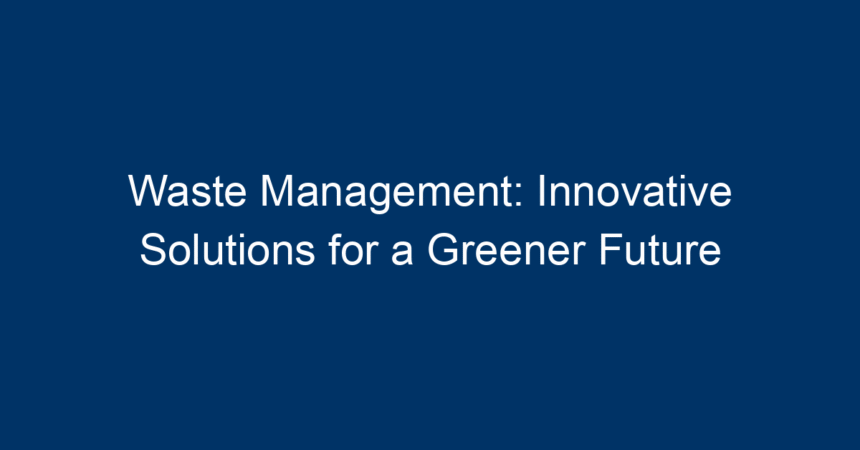In our rapidly industrializing world, effective waste management has become increasingly critical for environmental sustainability. As urbanization escalates and global populations grow, the quantity of waste produced continues to rise. Innovative solutions are urgently needed to tackle this growing issue and transition toward a greener future. From recycling technologies to community-driven initiatives, multiple strategies can ensure responsible waste management while promoting ecological balance.
In this article, we will explore the complexities of waste management, present innovative practices that are paving the way for sustainability, and provide actionable insights to help individuals and organizations make a difference.
Understanding Waste Management
What is Waste Management?
Waste management refers to the collection, transportation, treatment, and disposal of waste materials. It encompasses a variety of processes aimed at minimizing the environmental impact of waste and ensuring public safety. By managing waste effectively, communities can reduce pollution, conserve resources, and promote recycling and reuse.
The Importance of Waste Management
Proper waste management is crucial for several reasons:
-
Public Health: Inefficient waste disposal can lead to health hazards, including disease outbreaks and air and water pollution.
-
Environmental Protection: Mismanaged waste contributes to deforestation, greenhouse gas emissions, and biodiversity loss.
- Resource Conservation: Sustainable waste management practices promote the recycling and reuse of materials, reducing the need for virgin resources.
Current Challenges in Waste Management
Despite the importance of waste management, several challenges persist:
-
Rising Waste Volume: As urban populations grow, so do the amount and types of waste generated. Cities are struggling to keep up with this rapid increase.
-
Limited Recycling Infrastructure: Many regions lack adequate recycling facilities, which hinders their ability to manage solid waste effectively.
- Public Awareness and Participation: Lack of knowledge about proper waste disposal and recycling can lead to poor practices among citizens.
Innovative Solutions for Waste Management
1. Advanced Recycling Technologies
Recent advancements in recycling technologies offer a promising solution to the challenges of waste management. Technologies like chemical recycling can break down plastics into their original materials, allowing for endless recycling possibilities. Moreover, artificial intelligence (AI) is being employed in sorting facilities to improve efficiency and accuracy, ensuring that more recyclables are processed effectively.
2. Waste-to-Energy (WTE) Systems
Waste-to-energy systems convert non-recyclable waste materials into useful energy. This process not only reduces landfill waste but also generates electricity and heat. Countries like Sweden have successfully implemented WTE systems, transforming waste management into a valuable resource generation process. Such initiatives demonstrate that waste can be viewed not merely as a byproduct, but as a potential source of energy.
3. Composting Initiatives
Composting is an ancient practice that is gaining renewed popularity as an innovative solution for waste management. By composting organic waste, such as food scraps and yard waste, communities can reduce landfill contributions significantly. Municipal programs encouraging composting provide residents with bins and regular pickup services, enhancing participation. In addition, composting enriches soil health, contributing to local agriculture.
4. Digital Solutions and Apps
Technology can also facilitate waste management through various applications. Smartphone apps can educate users on local recycling rules, provide waste collection schedules, or offer tips for reducing waste. Furthermore, platforms designed for sharing and renting items can help communities reduce waste by extending the life cycle of products, thus promoting a circular economy.
5. Zero Waste Initiatives
The "Zero Waste" movement focuses on redesigning resource life cycles to minimize waste significantly. This approach encourages practices that prevent waste at its source, promoting sustainable consumption and production. Cities like San Francisco have implemented ambitious zero-waste goals, showcasing that it is possible to divert a significant percentage of waste from landfills through community efforts.
The Role of Communities in Waste Management
1. Grassroots Movements
Community involvement is vital for successful waste management. Grassroots movements can raise awareness about recycling and environmental issues, mobilizing citizens to participate actively in local initiatives. For instance, community clean-up events and educational forums can empower residents to take responsibility for their environment.
2. Local Government Engagement
Local governments play a pivotal role in waste management by providing accessible services and implementing regulations. By investing in recycling programs and waste management infrastructure, municipalities can foster sustainable habits within their communities. Public campaigns highlighting the importance of waste reduction can further engage citizens and create lasting behavioral change.
The Future of Waste Management
As we look toward the future, it is essential to foster innovation in waste management to address environmental challenges. Emphasizing circular economy principles can help societies transition from traditional waste production to sustainable practices. By embracing sustainable materials management, businesses can minimize waste through design thinking, promoting products that are recyclable or compostable.
1. Investment in Research and Development
Investing in research and development enables the exploration of new waste management technologies. Innovations focused on bioengineering, waste sorting, and localization of recycling processes will progress the waste management agenda significantly.
2. Education and Awareness Campaigns
In the quest for effective waste management, education is key. Comprehensive programs aimed at schools, businesses, and community groups can raise awareness of environmental issues, enabling individuals to understand their impact on the planet.
Actionable Insights for Individuals and Organizations
-
Conduct a Waste Audit: Assess the waste your household or business generates. Understanding your waste profile will help identify areas for reduction and improvement.
-
Embrace Recycling: Learn your local recycling rules and ensure that you are participating actively. Encourage others in your community to do the same.
-
Practice Composting: Begin composting kitchen scraps and yard waste. Many municipalities offer compost systems or resources to help you get started.
-
Support Sustainable Products: Choose products that are designed for reuse and recycling. Support companies that prioritize sustainability in their operations.
- Engage in Community Initiatives: Participate in local clean-up events or advocacy groups focused on waste management. Your involvement can make a significant impact.
Conclusion
Waste management is not a solitary endeavor; it requires collective action and innovative solutions to reshape our relationship with waste. By prioritizing sustainability, adopting new technologies, and fostering community initiatives, we can build a greener future. Each small step toward responsible waste management can lead to significant environmental benefits, enhancing public health and preserving natural resources for future generations. Let us commit to these practices and embrace a more sustainable way of living—together, we can pave the way for a cleaner, greener planet.
By implementing these strategies and fostering community engagement, we take tangible steps toward an environmentally sustainable future, where waste management is not a burden, but a collective opportunity for improvement and innovation.




